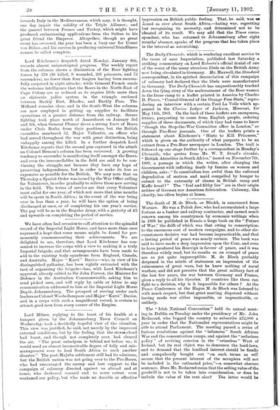Lord Kitchener's despatch dated Monday, January 6th, records almost uninterrupted
progress. The weekly report from the columns shows a diminution of the Boer fighting forces by 378 (36 killed, 9 wounded, 261 prisoners, and 72 surrenders), no fewer than four laagers having been success- fully surprised in night attacks ; while General French sends the welcome intelligence that the Boers in the North-East of Cape Colony are so reduced as to require little more than an elaborate police system in the triangle enclosed between Barkly East, Rhodes, and Barkly Pass. The Midland remains clear, and in the South-West the columns are now employed in getting up supplies to facilitate operations at a greater distance from the railway. Severe fighting took place north of Amersfoort on January 3rd and 4th, when General Plumer drove a strong force of Boers under Chris Botha from their positions, but the British casualties numbered 52, Major Vallentin, an officer who bad served throughout the war with great distinction, being unhappily among the killed. In a further despatch Lord Kitchener reports that the second gun captured in the attack on Colonel Benson's column has been recovered. A growing tendency to surrender is manifesting itself amongst the Boers, and even the irreconcilables in the field are said to be con- tinuing the struggle, not because they have any hope of preserving independence, but in order to make its loss as expensive as possible for the British. We may note that on Thursday a Special Order was issued by the War Office calling for Volunteers, in order gradually to relieve those now serving in the field. The terms of service are that every Volunteer must enlist for one of which not more that nine months will be spent in South Africa; in the event of the war being over in less than a year, he will have the option of being discharged at once, or of completing his one year's service. The pay will be as in the Regular Army, with a gratuity of £5 and upwards on completing the period of service.






































 Previous page
Previous page